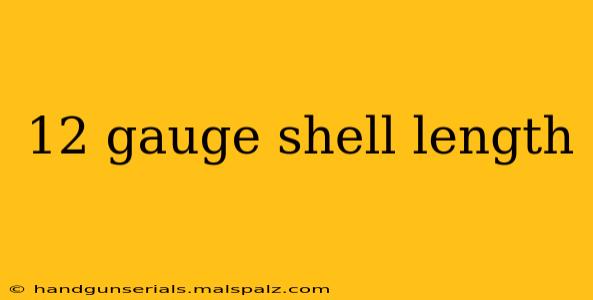The length of a 12 gauge shotgun shell is a crucial factor influencing its performance and suitability for various applications. Understanding the different lengths available, their respective uses, and the implications of choosing one over another is vital for both seasoned hunters and new shooters. This comprehensive guide delves into the specifics of 12 gauge shell lengths, helping you make informed decisions based on your needs.
Standard 12 Gauge Shell Lengths
While there's a range of 12 gauge shells available, several lengths dominate the market:
-
2 3/4 inches (70mm): This is the most common and versatile length, ideal for a wide array of purposes, from hunting small game to target shooting. Its widespread availability and affordability make it a popular choice for many shooters. The shorter length generally translates to a lighter recoil, beneficial for beginners or those shooting frequently.
-
3 inches (76mm): Offering increased payload capacity compared to the 2 3/4-inch shell, the 3-inch variant packs more shot or slugs, leading to greater range and stopping power. This makes it a preferred choice for hunting larger game, waterfowl, or situations requiring more knockdown power. The increased powder charge also results in a more substantial recoil.
-
3 1/2 inches (89mm): The longest commonly available 12 gauge shell, the 3 1/2-inch magnum, delivers the highest energy and payload. This makes it suitable for the largest game animals, but the significant recoil should not be underestimated. This length is often seen in waterfowl hunting where extreme range and penetration are necessary.
Understanding the Implications of Shell Length
The choice of shell length is not arbitrary; it directly impacts several factors:
Payload:
Longer shells inherently accommodate more shot or a larger slug, increasing the overall payload. This translates to greater range, denser patterns, and increased lethality.
Recoil:
Longer shells generally produce more recoil due to the increased powder charge required to propel the larger payload. This is a critical consideration for shooters, particularly those with less experience or physical limitations.
Shotgun Compatibility:
Not all shotguns are compatible with all shell lengths. Always check your shotgun's specifications to ensure it can safely handle the intended shell length. Using an incorrect length can lead to malfunction or damage to the firearm.
Hunting Applications:
The appropriate shell length depends heavily on the target game. Smaller game like squirrels or rabbits may be adequately addressed with 2 3/4-inch shells, while larger game like deer or waterfowl often require the greater power of 3-inch or 3 1/2-inch shells.
Choosing the Right 12 Gauge Shell Length
Selecting the right shell length is a crucial step in ensuring both safety and effectiveness. Consider these factors:
- Your Shotgun: Verify your shotgun's compatibility with different shell lengths.
- Target Game: The size and type of game you're hunting will significantly influence the choice.
- Your Experience Level: Beginners should start with shorter, lighter-recoiling shells.
- Your Physical Capabilities: Consider recoil management, especially for longer shooting sessions.
By carefully considering these aspects, you can select the 12 gauge shell length that best suits your needs and ensures a safe and successful shooting experience. Remember to always prioritize safety and handle firearms responsibly.

